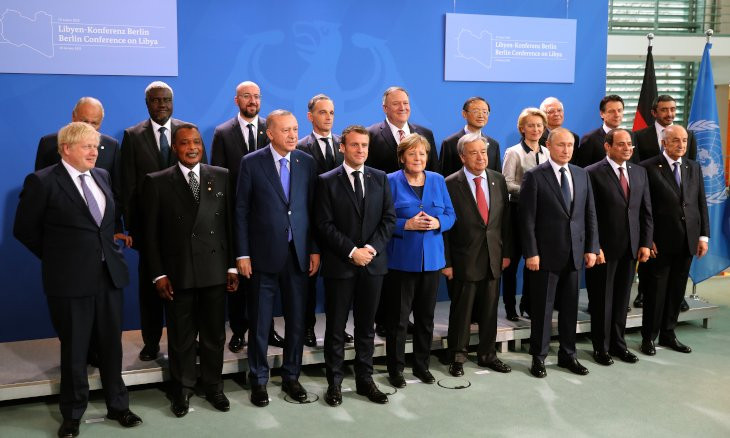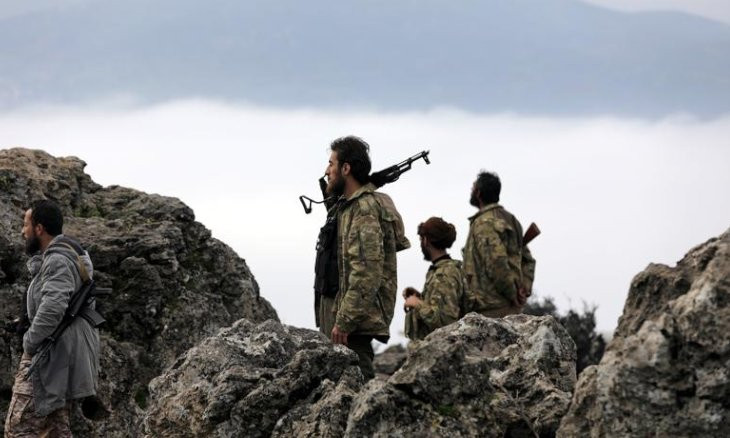Erdoğan says Somalia has invited Turkey to explore for oil in its seas
President Erdoğan has said that Somalia has invited Turkey to explore for oil in its seas and Ankara will take steps in line with the Somali invitation, without elaborating further. "There is an offer from Somalia. They are saying: 'There is oil in our seas. You are carrying out these operations with Libya, but you can also do them here.' This is very important for us," Erdoğan said on Jan. 20.
Duvar English
President Recep Tayyip Erdoğan said on Jan. 20 that Somalia had invited Turkey to explore for oil in its seas and Ankara would take steps in line with the Somali invitation, without elaborating further.
"There is an offer from Somalia. They are saying: 'There is oil in our seas. You are carrying out these operations with Libya, but you can also do them here.' This is very important for us," Erdoğan said, while speaking to reporters on his flight back from a Libya summit in Berlin.
"Therefore, there will be steps that we will take in our operations there."
Turkey has been a major source of aid to Somalia following a famine in 2011 as Ankara seeks to increase its influence in the Horn of Africa to counter Gulf rivals like Saudi Arabia and the United Arab Emirates.
Turkish engineers are helping build roads in Somalia, and Turkish officers have trained Somali soldiers as part of efforts to build up the country's army.
In late December, a group of Turkish engineers was among those hit in a blast at a checkpoint in Mogadishu that killed at least 90 people. At the weekend, a car bombing wounded some 15 people, including Turkish contractors, in Afgoye in an attack claimed by Somali insurgents.
Erdoğan questions Haftar's intention for peace
Erdoğan also touched upon the Jan. 19-dated Berlin summit, in which world powers discussed the way forward to end the conflict in Libya.
He said although warring Libya factions had agreed to set up a ceasefire committee to hash out the terms of a more permanent halt to fighting, he did not fully trust eastern commander Khalifa Haftar's intention for peace as he did not sign any document and just gave his verbal affirmation at the summit.
“Of course, the fact that Haftar has not so far signed any document is rather meaningful. Everything [agreed on at the summit] is a verbal affirmation and I expressed this [to the world powers] through our proverb, 'The palest ink is stronger than the sharpest memory.' We said that this [intention for peace] needs to be confirmed with a signature, but despite this, nothing was signed,” Erdoğan said, expressing his wish that the summit would lead to a fruitful result.
 Foreign powers back Libya ceasefire as commander's forces choke oil flows
Foreign powers back Libya ceasefire as commander's forces choke oil flowsErdoğan added that Turkey's presence in the North African country increased hopes for peace and Turkey had not yet sent any troops into Libya to support the country's internationally-recognized government, but only military advisers and trainers.
Despite Erdoğan's statement, several media outlets have in recent weeks reported that Turkey has trained and sent Syrian rebels to Libya to fight alongside the U.N.-backed Government of National Accord (GNA).
 Turkey 'sending 2,000 Syrian rebels to Libya'
Turkey 'sending 2,000 Syrian rebels to Libya'Haftar, who is backed by Russia but walked out of truce talks in Moscow last week, and Libya’s internationally recognized Prime Minister Fayez al-Sarraj will now put forward five names each for a committee to hash out the terms of a more permanent halt to the conflict, with the United Nations pushing for a meeting of that group in Geneva within days.
Neither Sarraj nor Haftar were in the room for the summit on Jan. 19, and organizers were careful to ensure they did not cross paths in Berlin. Instead they were holed up for some of the day at separate hotels in the city.
Putin fails to accept Assad 'is waging state terror'
Erdoğan also said that another issue that was discussed at the summit was Syria's Idlib region. He said that he talked about this issue both during the summit and his bilateral meeting with his Russian counterpart Vladimir Putin.
Erdoğan said that the groups that Turkey labels as “moderate oppositions” are seen as “terrorists” by Russia. “I told him [Putin] this: 'You call these groups as terrorists, but the [Bashar] Assad regime is waging state terror. This man [Assad] has killed thousands of people and is still dropping bombs in Idlib.' But, of course he [Putin] cannot accept this,” Erdoğan said.
Hundredsof thousands of people have fled Idlib province in recent weeks asRussian jets and Syrian artillery have pounded towns and villages ina renewed government assault aimed at clearing the opposition.
U.N.officials said this month the humanitarian crisis had worsened withat least 300,000 civilians now on the run in Idlib province on top ofover half a million who fled earlier bouts of fighting to the safetyof camps near the Turkish border.
